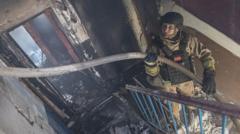In a grim escalation of violence in Gaza, health authorities have reported that Israeli military actions resulted in the deaths of at least 32 individuals on Saturday, with Palestinian media claiming the military fired near a food distribution site. This incident follows the United Nations' alarming statistics revealing over 670 Palestinians have died since the controversial aid distribution system, established by Israel in May, came into effect.
Gaza Strikes: Rising Death Toll Amid Controversial Aid Distribution System

Gaza Strikes: Rising Death Toll Amid Controversial Aid Distribution System
Health officials report 32 deaths linked to Israeli military actions near aid sites, intensifying scrutiny of new food distribution program.
The Nasser Medical Complex, a prominent hospital in southern Gaza, confirmed receiving 29 bodies from the distribution points, though it did not clarify the circumstances of their deaths. The new aid distribution system, aimed at thwarting the misappropriation of food supplies by Hamas, has replaced the extensive UN-run program that previously served Gaza. Although Israeli officials insist the system is essential for preventing food hoarding and ensuring it reaches the intended civilians, critics argue it has transformed food access into a perilous endeavor, with crowded conditions making civilians vulnerable to military actions.
Concerns have been raised repeatedly as Israeli troops have been documented opening fire on Palestinian crowds gathering for food supplies. While Israeli officials have acknowledged instances of gunfire towards crowds, they have downplayed the casualty numbers presented by various groups. Moreover, the Gaza Humanitarian Foundation, managed partly by Israeli interests, has distanced itself from the violence, claiming that conditions at their aid sites remain relatively safe and placing blame for unrest on Hamas.
Despite these claims, humanitarian organizations have pointed out that hunger remains pervasive in Gaza, exacerbated by an 80-day blockade curtailing food and fuel access earlier this year. In a recent report, UNRWA revealed alarming malnutrition statistics among children, indicating that ongoing struggles with food insecurity persist amid the enhanced aid distribution framework.
Ameera Harouda contributed reporting.
Patrick Kingsley is The Times’s Jerusalem bureau chief, focusing on coverage surrounding Israel, Gaza, and the West Bank.
Concerns have been raised repeatedly as Israeli troops have been documented opening fire on Palestinian crowds gathering for food supplies. While Israeli officials have acknowledged instances of gunfire towards crowds, they have downplayed the casualty numbers presented by various groups. Moreover, the Gaza Humanitarian Foundation, managed partly by Israeli interests, has distanced itself from the violence, claiming that conditions at their aid sites remain relatively safe and placing blame for unrest on Hamas.
Despite these claims, humanitarian organizations have pointed out that hunger remains pervasive in Gaza, exacerbated by an 80-day blockade curtailing food and fuel access earlier this year. In a recent report, UNRWA revealed alarming malnutrition statistics among children, indicating that ongoing struggles with food insecurity persist amid the enhanced aid distribution framework.
Ameera Harouda contributed reporting.
Patrick Kingsley is The Times’s Jerusalem bureau chief, focusing on coverage surrounding Israel, Gaza, and the West Bank.





















